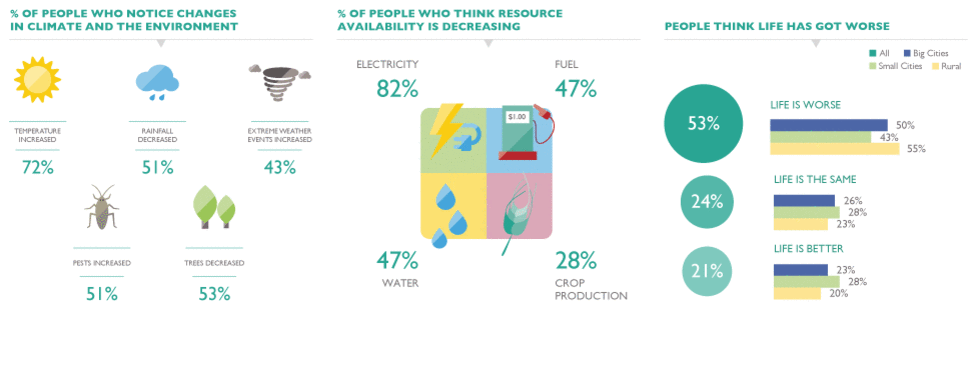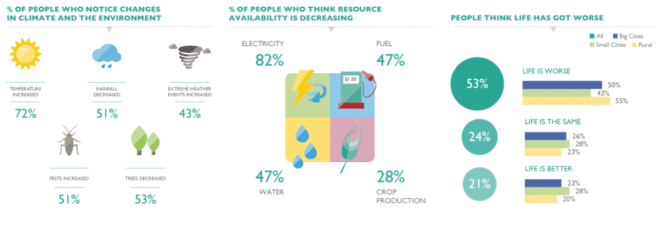Perceptions of Climate Change in Pakistan

The Climate Asia project
Climate Asia is the largest ever study of people’s experience of climate change in seven countries – Bangladesh, China, India, Indonesia, Nepal, Pakistan and Vietnam – involving the collection and analysis of survey data from over 33,500 people. This unique data provides information for governments, donors, the media, NGOs and everyone who wants to support people to adapt to the changing environment.
Country Infographic

Context
Pakistanis, in contrast to their counterparts across the region, feel that their lives have got worse. People living in large cities are most concerned about a lack of electricity and fuel, while lack of food is the biggest concern for people in rural areas.
Confidence in government is very low, and Pakistanis feel that the government doesn’t listen to the needs of its people. Inflation is high and people are feeling pressure on their household incomes.
These difficulties have been aggravated by changes in climate. People across Pakistan are experiencing unpredictable rainfall, increased temperatures and changes to the seasons. Other changes vary by region, such as increased rainfall and extreme weather events in Sindh and decreased rainfall in Balochistan. People feel that the environment has also changed, with pests such as mosquitos increasing and trees being cut down.
The impacts of these changes include a reduction in crop productivity forcing some rural communities either to change livelihoods or buy food that they cannot afford. People have health concerns such as increases in infectious diseases.
Compared with the other countries in this study, people in Pakistan feel most strongly that these changes are having a high level of impact on their lives now.
This feeling has driven Pakistanis to act. Their biggest motivator is the need to survive. Knowing that government support will be limited, they have started to take action themselves by working together in their communities or through the support of NGOs. Information is also playing a role in equipping people to act. Those who feel more informed are adapting more to the changes. However, those without access to resources, relevant information or community support are not able to cope and feel helpless.
Communication
The role for communication is twofold: to support those who are taking action to respond more and to inspire and empower people who are struggling to act.
For those who are already taking action, there is a need for practical information on actions that can be taken to deal with these issues, such as saving water, changing agricultural practices to improve crops, or learning alternative skills to supplement income.
People struggling to act need to be encouraged to work together by being inspired by examples of other communities who are taking action.
Media and interpersonal communication should both play a role. Television is the most accessed medium both in urban and rural areas, even though some rural areas are still unable to access TV or electricity. People from rural areas trust members of their communities the most and would like to receive information from them too. Mobile phone usage is relatively high in Pakistan, and is used for calling and texting.
Findings
62% of respondents said they watched TV yesterday or today.
45% of people in rural areas prefer to receive information on these issues through TV and16% prefer hearing about them through members of their communities.
Access to mobile phones is lower among women, and only 40% used one yesterday or today compared with 75% of men.
57%used a mobile phone yesterday or today.
11%feel that the media is covering issues related to climate change fairly or very well.
54% of people in Pakistan think life has become worse.
(0) Comments
There is no content